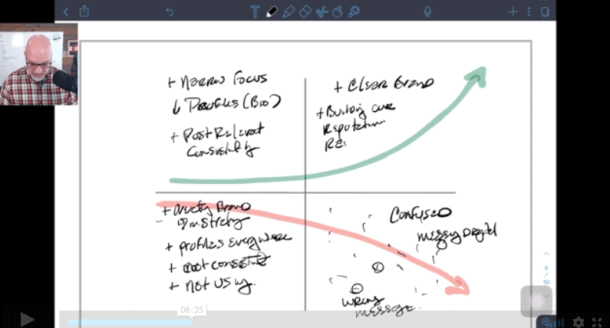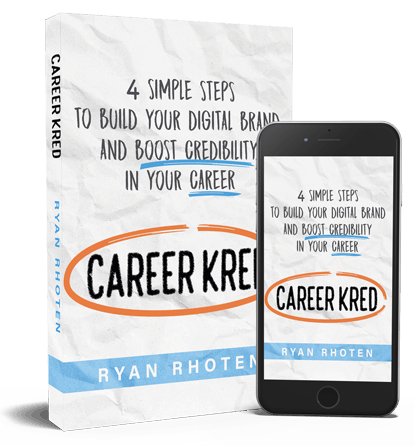In last week’s post, I provided the basic definitions needed to get started becoming the Google of your niche. If you haven’t read it yet, I recommend you take a few minutes to do so before you read this one.
You can read that post HERE.
With the basic definitions in hand this post aims to expand the concept of keywords because it’s that important.

KEYWORDS
You’ll recall from last week keywords are informative words used in an information retrieval system to indicate the content of a document.
To become the Google of your niche, your name needs to become synonymous with your keywords. You might be asking yourself, “How do you know which keywords to “go after”? Like everything in personal branding the answer is simple, getting to it, however, is not easy.
Todd Lohenry, an online reputation management specialist from toddlohenry.com suggests you ask yourself this question when contemplating keywords.
“What words do you want people to know you for?”
Think about it for a minute. Refer back to the definition of a niche. You are an expert at something. Once you’ve identified your area of expertise you need to examine it for keywords.
Take me for example. I am a personal branding enthusiast. Personal branding is a big, competitive topic and while I do someday want to rank for the keyword I know in the short-term this is unlikely to happen.
Note: Read the last paragraph. Pay attention to how many times I used my keyword, personal branding. Opps! I did it again.
At any rate, what is highly likely to happen is Google indexing this post, noting the use of the keyword and filing it under the highly competitive category of personal branding.
“NICHE DOWN”
Many people write about personal branding, especially now as it is becoming more relevant in today’s changing world of work as I discussed with Steven and Irene McConnell on the podcast.
In fact, some people have been writing about it for a very long time. They have a lot of content and Google views it as highly relevant so it ranks their content high. This makes breaking through for the keyword personal branding challenging.
However, within the category of personal branding, we can find areas that are less competitive and, therefore, easier to rank for in Google. To find them we need to explore our larger topic “niche it down” into something a little less competitive.
There are a few ways we can do this. My favorites include using Google keyword search and Google trends. I will also on occasion use the Google keyword planner.
Google Search
Google is amazing. It can shift through hundreds of thousands of websites in tenths of seconds to find relevant content to the keywords you are looking for about a given topic.
While this is, of course, awesome, another great thing about Google search is all searches are saved. This helps Google “guess” at what you are trying to type.
You know what I mean. You start to type something into the search bar and Google automatically starts populating the rest of what it believes to be your keyword.

Pay attention to a couple of items in the picture. First, note the grayed out “ding” behind the cursor? That’s Google predicting what I’m going to type.
Selecting personal branding reveals below the search box that there are approximately 23 million possible results. It goes without saying but that’s a lot. So let’s continue typing.

By the time I get the end of the keyword personal branding, Google is already suggesting additional keywords within the larger category. Each one of these suggestions is an example of “niching down” within personal branding.

Selecting personal branding tips, for example, yields only 6.8 million results. I’ve narrowed the competition and now have a much better chance of showing up on page one for the SERP if I were to write about tips vs. personal branding on its own.
I can now use this keyword as a title to my blog posts, on my YouTube channel or even my Book.
Pressing the space bar after the “s” in tips allows me to niche down even further.

Look at what people are searching for related to personal branding. All of the results shown here are examples of “niching down” within your area of expertise. All will allow interested parties to find you.
Before I move off the topic of search, here’s another cool trick to try by taking advantage of Google’s autofill alphabetically.
Remember Google captures everything typed in its search bar which means we can use it. Start by typing in your keyword. Then type the letter “A”.

Look at the suggestions Google provides for personal branding “a”. All of these would make great blog post titles or provide an area within your area of expertise that can be used to rank easier in SERP.
Try repeating this with each letter of the alphabet. You may be surprised at what you find.
Google Trends
Another great way to review keywords in your area of expertise if to use Google trends.
Since Google is already keeping track of the keywords entered into its search bar, It is in a great position to also show us how well or not so well any given keyword is performing over time.
Enter Google trends.
Searching for a keyword in Google trends reveals several things. First, you see the trend over time for that keyword.
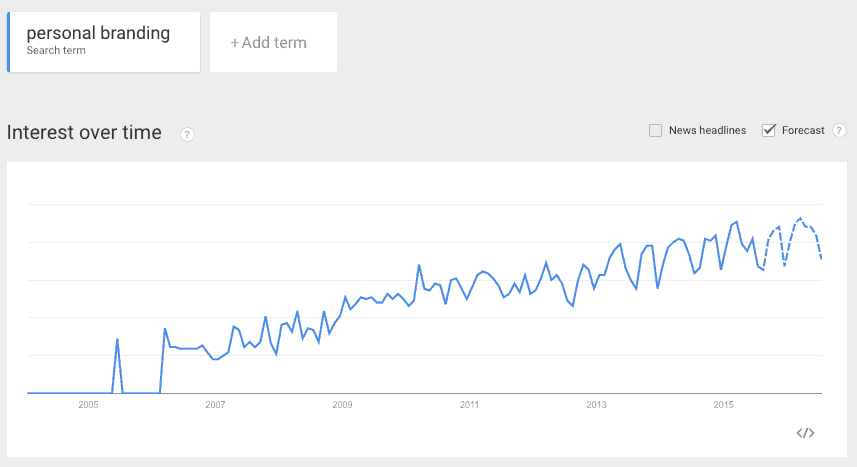
You can discover the geographical area that is the most interested in the topic.
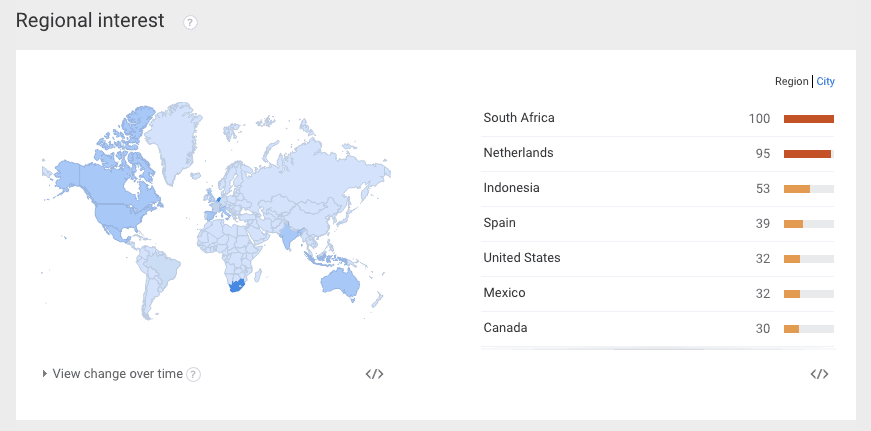
You can also find related searches for the keyword. Usually, these are the niches within the larger topic.
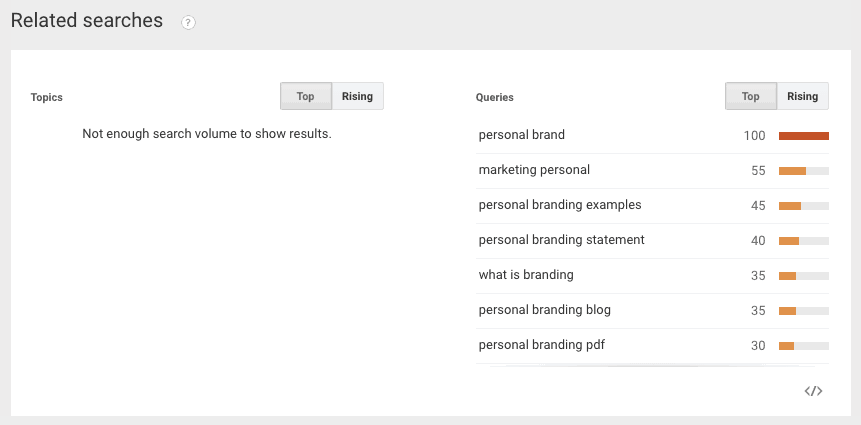
Google trends is a great tool for making sure you don’t attempt to rank for a keyword people are no longer searching for.
Google Keyword Planner
This method is a little advanced and requires an AdWords account. This will not be a tutorial on AdWords. If you’re interested you can find out more about AdWords HERE.
The Keyword planner tool can be found here. It is complex and a little daunting at first. Fortunately, there are a number of classes you can take to teach you how to use it.
In the spirit of the series on how to become the google of your niche (keyword), I’ll keep this one brief.
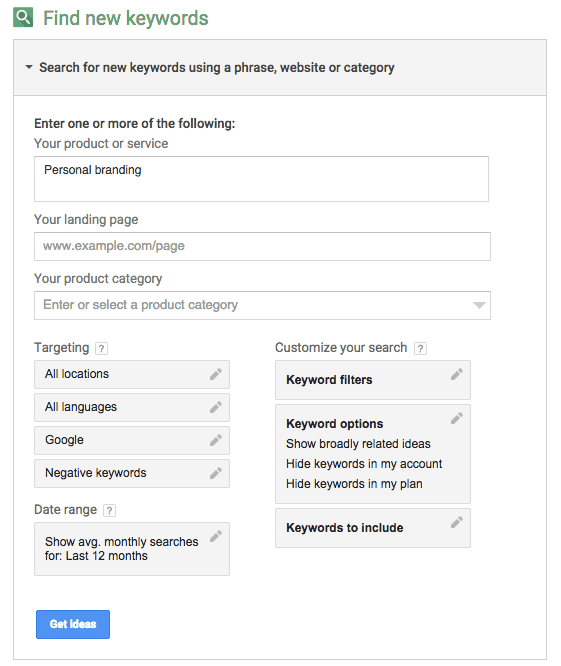
As you can see there are a lot of options to choose from in this search box. Choosing to only use the product or service box will keep the results at a high level. Bear in mind the higher the level of your keyword, the higher level your results will be and the harder it will be to rank for said keyword.
The real power of this tool comes from being able to target and customize your results. Searching on personal branding alone yields the following results.

Interestingly, despite 23 million potential results, Google considers the keyword personal branding to have low competition. On average 920,590 people are searching for the keyword personal branding every month.
Pretty cool, eh?
I use this particular tool the least when looking for keywords. I haven’t spent a lot of time with it so there are still many things I’m learning about how to best use it. I included it here because it does provide some very cool information.
SUMMARY
You can put as much or as little time into finding the keywords you want people to know you for. I recommend putting in more time to understanding which keywords to use because it’s important for your online reputation management.
Why? The answer is simple:
“If you don’t know what you want to be found for online, how is Google suppose to know?”
If you want Google to behave and provide prospective clients, customers, or employers with a comprehensive view of who you are and your area(s) of expertise, then you need to actively manage your online reputation.
Becoming the Google of your niche is all about telling Google what you want people to find. And the truth of the matter is if you don’t define what that is, Google will do it for you. Whether you want it to or not.
Don’t let Google define you. Manage your online reputation by knowing the keywords you want to be found for within your niche.
Now that you’ve got keywords down, in my next post, the third in this installment, I’ll discuss how to use keywords in content creation and why it’s important.
See you in installment three.
